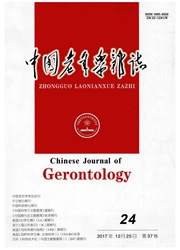

 中文摘要:
中文摘要:
目的探讨炎症状态下增龄对肾小球内皮损伤的影响,比较低分子肝素和尿激酶对损伤的保护作用。方法3月龄及27月龄雌性Wistar大鼠各40只,随机分为正常对照组(NC组)、脂多糖(LPS)组(L组)、LPS+氨甲环酸组(LT组)、LPS+氨甲环酸+低分子量肝素组(LTH组)及LPS+氨甲环酸+尿激酶组(LTUU组)。采用直接免疫荧光检测肾小球纤维蛋白沉积,Western印迹法检测血管内皮血栓调节蛋白(TM),纤溶酶原激活物抑制物1(PAI-1)蛋白质表达。结果(1)LPS刺激后纤维蛋白沉积增多(P〈0.05),TM几乎无表达(P〈0.01),PAI-1表达明显上调(P〈0.05);(2)加用氨甲环酸后,PAI-1表达进一步上调(P〈0.05);(3)应用低分子肝素和尿激酶后纤维蛋白沉积明显减轻(P〈0.05),PAI-1表达与LT组比较明显下调(P〈0.05),TM表达增多(P〈0.05),两组之间无统计学差异。(4)老年大鼠各组肾小球纤维蛋白沉积均比相同干预组的青年大鼠明显,PAI-1的表达均较青年大鼠相同干预组显著增多,TM表达则显著减少,差别均有统计学意义(P〈0.05)。结论增龄可加重LPS诱导的肾小球内皮损伤;低分子肝素与尿激酶均能有效保护老年大鼠肾小球血管内皮损伤,两者无明显差别,但增龄可减弱低分子肝素和尿激酶对血管内皮的保护作用。
 英文摘要:
英文摘要:
Objective To investigate the effect of aging on glomerular endothelial inflammatory injury, and to investigate the protective roles of heparin and urokinase. Methods Both 3-(young) or 27-month-old (aged) Wistar rats were randomly divided into five groups ( per group n = 8) : normal control (NC) group, lipepelysaccharide (L) group, LPS and tranexamic acid (LT) group, LPS and tranexamic acid treatment with heparin (LTH) group, and LPS and tranexamic acid treatment with urokinase (LTU) group. Fibrin deposition were detected by immunohistochemical staining. Western blot were used to determine plasminogen activator inhibitor (PAI)-1, ICAM-1 and thrombomodulin (TM) expressions. Results (1) LPS induced the deposit of fibrin and the expressions of PAI-1 ( P 〈 0. 05 ), reduced the expression of TM ( P 〈 0. 05). (2) The expressions of PAI-1 in LT groups were up-regulated than those in L groups ( P 〈 0. 05 ). (3) Fibrin deposition, PAL-1 expressions were lower, and TM expression was higher, in LTH and LTU groups than those in LT group (P 〈0. 05). No differences of fibrin deposition, TM, and PAI-1 expressions were found between LTH and LTU group ( P 〉 0.05). (4) In aged rats, more fibrin deposition, PAI-1 expressions and less TM expression were found in L, LT, LTH and LTU groups than those in the young rats ,( P 〈 0. 05 ). Conclusions Aging may contribute to glomerular endothelial inflammatory injury and impair the protective role of low-dose heparin or urokinase. Both low-dose heparin and urokinase can effectively decrease endothelial injury.
 同期刊论文项目
同期刊论文项目
 同项目期刊论文
同项目期刊论文
 期刊信息
期刊信息
